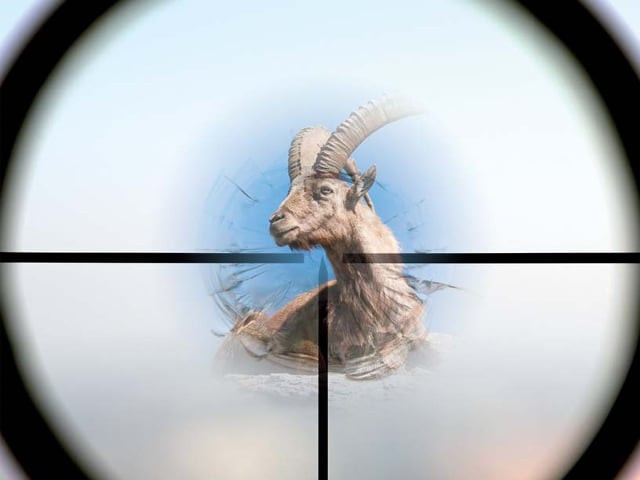Wildlife hunting: David herdsman protects animals against Goliath sardars
The ibex live in the Kirthar range caves and are attracted to the sweetwater springs.

Enter 58-year-old Qasim Malokani, alias Qaso, a herdsman who has been nursing a gunshot wound in his right hand after a gunbattle a few days ago with the supporters of a tribal chief. They exchanged fire over hunting the ibex and other endangered species in the range of the Khirthar mountains near Johi taluka, Dadu in Sindh.
Qaso lives with his family in a little village called Shahi Makan located inside the mountain. According to him, protecting the local wildlife is their passion and he has been doing this job as have his ancestors for decades. “I have seen my grandfather weeping whenever an ibex used to die,” he says. “So how can we give these nasty people permission to kill them?”
According to Qaso, an estimated 2,000 ibex are living in the caves on the Sindh side of the mountain range with Balochistan on the other side. He and his family stand up to tribal chiefs such as Yar Muhammad Rind of Balochistan. “My sons and I will guard the animals to death because these ibex are like family,” he says.
Hunting can only take place by permit and there is a 200,000-rupee fine for breakign the law. For this year, only five permits were issued at $3000 for foreigners and Rs50,000 for locals, a pittance given the value of the target. The people who hunt the ibex are known as trophy hunters because it is so rare.
The mountain goats are attracted to Qaso’s village because of a sweetwater spring. “They are not afraid of our families, because we have never ever killed any of them,” he says. These days the fight is heating up because winter is hunting season for tribal chiefs and foreigners.
Qaso claims that he has come under attack nearly a dozen times by the Rind gunmen and men from other influential clans for trying to prevent them from hunting in the area. In retaliation, they have had the local police register a dozen criminal cases against him.
Qaso has acquired legendary status in the area and other people have been observing these goings-on for a while. “The only goal of these people is to threaten Malokani, to scare him into leaving the area so they can hunt at ease,” says local journalist Qadir Lashari, testifying to Qaso’s reputation as a “poor man with a loving nature for the animals”. In fact, the area is known as Qaso je Rakh [Qaso’s protected area] where hunting is prohibited. “But unfortunately no one comes to his aid and there seems to be no writ of the wildlife department.”
Local social activist Ghafoor Leghari recalls how two years ago, a few ibex were killed by influential people and Qaso was arrested by the police who were pressured by an oil and gas exploration company that was eyeing the area.
“When officials of the company visited the area and wanted to blow up a few caves, Qaso Malokani stood up to them,” says Leghari. Qaso only agreed when the officials assured him that no animal would be harmed. But when the work started, Qaso resisted. The company marched off to the district police, registered a complaint and had his village raided and him arrested.
One name that keeps cropping up is that of Sardar Yar Muhammad Rind, the tribal chief of the Rind tribe who was a federal minister and opposition leader in the Balochistan Assembly. Rind has land in Jhangara, Jamshoro district, and frequently visits the area to hunt. Qaso stands up to him.
“[The land] is not the state of Qaso Malokani,” says Sardar Rind while talking to The Express Tribune. “He is a criminal by profession and recently snatched 200 goats from people living on the Balochistan side.”
Rind stresses that Qaso has no jurisdiction and authority in the area, especially the caves where the ibex live, which used to fall under the State of Kalat. But in a country where tribal affiliations hold stronger than geographical borders, it almost matters more that the area is occupied by Baloch men of the Rind tribe even though the British handed over the land to Sindh in 1830. “A majority of the people have left the area because of the terror of Qaso Malokani,” says Sardar Rind. It is a lie, he maintains, that Qaso protects the ibex. “He facilitates many tribal chiefs from Balochistan in the hunt.”
For their part, the wildlife department seems to be unaware of the turf war. Official Hussain Bux Bhagat said he would inquire into the matter. One way people protect wildlife in this part of the world is by declaring the area their property. Several influential families have taken the task upon themselves, including the Mirs of Khairpur with Mehranvi, Zulfiqar Shah Jamot in Matiari, the Pir of Ranipur, the Makhdooms of Hala and the Chandios of Kamber-Shahdadkot district. But for every sardar or Qaso who undertakes wildlife protection there are 10 trophy hunters to challenge them.
Published in The Express Tribune, December 12th, 2010.

















COMMENTS
Comments are moderated and generally will be posted if they are on-topic and not abusive.
For more information, please see our Comments FAQ